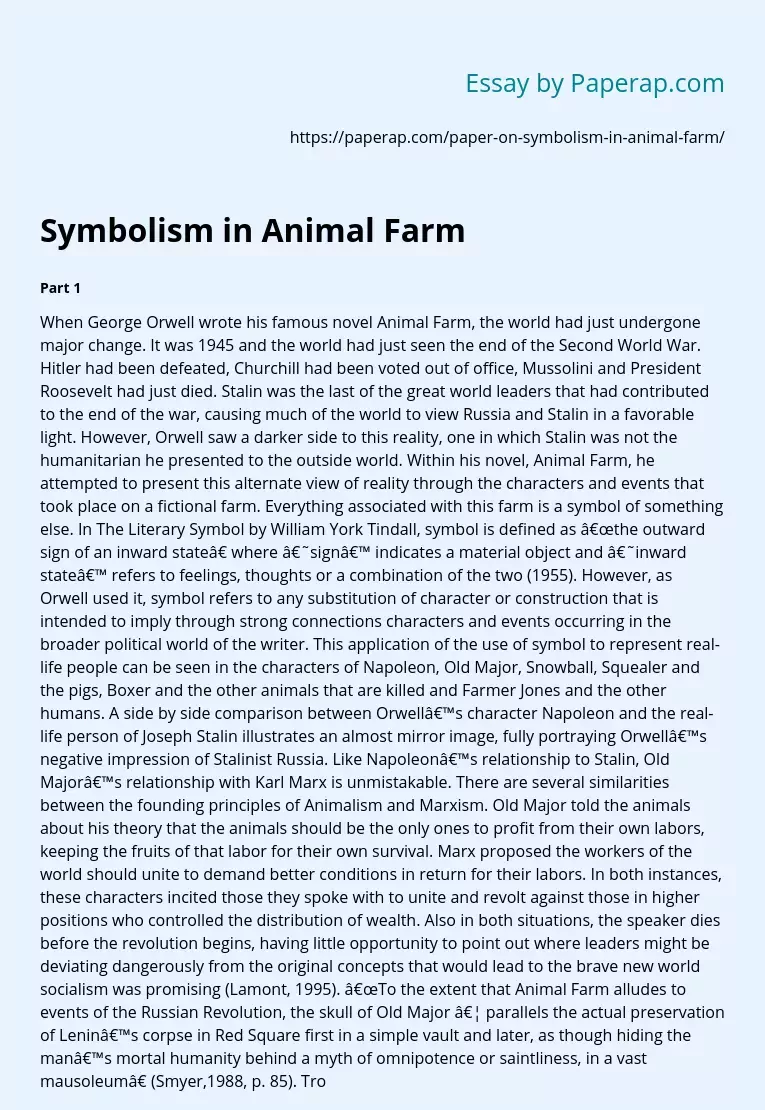Symbolism in Animal Farm
Part 1
When George Orwell wrote his famous novel Animal Farm, the world had just undergone major change. It was 1945 and the world had just seen the end of the Second
World War. Hitler had been defeated, Churchill had been voted out of office, Mussolini and President Roosevelt had just died. Stalin was the last of the great world leaders that
had contributed to the end of the war, causing much of the world to view Russia and
Stalin in a favorable light.
However, Orwell saw a darker side to this reality, one in which Stalin was not the humanitarian he presented to the outside world. Within his
novel, Animal Farm, he attempted to present this alternate view of reality through the characters and events that took place on a fictional farm. Everything associated with this
farm is a symbol of something else. In The Literary Symbol by William York Tindall, symbol is defined as “the outward sign of an inward state” where ‘sign’ indicates a
material object and ‘inward state’ refers to feelings, thoughts or a combination of the two (1955).
However, as Orwell used it, symbol refers to any substitution of character or
construction that is intended to imply through strong connections characters and events occurring in the broader political world of the writer. This application of the use of
symbol to represent real-life people can be seen in the characters of Napoleon, Old Major, Snowball, Squealer and the pigs, Boxer and the other animals that are killed and Farmer Jones and the other humans.
A side by side comparison between Orwell’s character Napoleon and the real-life person of Joseph Stalin illustrates an almost mirror image, fully portraying Orwell’s negative impression of Stalinist Russia. Like Napoleon’s relationship to Stalin, Old Major’s relationship with Karl Marx is unmistakable. There are several similarities between the founding principles of
Animalism and Marxism. Old Major told the animals about his theory that the animals should be the only ones to profit from their own labors, keeping the fruits of that labor for their own survival. Marx proposed the workers of the world should unite to demand better conditions in return for their labors. In both instances, these characters incited those they spoke with to unite and revolt against those in higher positions who controlled the distribution of wealth. Also in both situations, the speaker dies before the revolution begins, having little opportunity to point out where leaders might be deviating dangerously from the original concepts that would lead to the brave new world socialism was promising (Lamont, 1995). “To the extent that Animal Farm alludes to events of the Russian Revolution, the skull of Old Major … parallels the actual preservation of Lenin’s corpse in Red Square first in a simple vault and later, as though hiding the man’s mortal humanity behind a myth of omnipotence or saintliness, in a vast mausoleum” (Smyer,1988, p. 85).
Trotskian tendencies abound in the character of Snowball throughout the novel. Like Trotsky, Snowball is young, smart and idealistic with a good sense for public
speaking. True to the ideals of Animalism, Snowball, like Trotsky, truly held to his belief that life could be made better for all of the animals on the farm and worked diligently to bring that dream about. When he was chased from the farm by Napoleon’s dogs, in much the same way that Trotsky was chased from Russia by Lenin’s KGB, he worked to spread the ideas of Animalism as much as he could in the outer world beyond the gates of the Animal Farm (Lamont, 1995) until he disappears from the story altogether, except as a threat and continued scapegoat for conspiracies against the farm. Even without his presence on the farm, Snowball is seen to be the power behind the show trial of four pigs who claimed to have been meeting with Snowball since his expulsion, resulting in their throats being torn out by the dogs as punishment for working against Napoleon. “In a terrible voice, Napoleon demanded whether any other animal had anything to confess.
Symbolism in Animal Farm. (2019, Jan 23). Retrieved from https://paperap.com/paper-on-symbolism-in-animal-farm/

